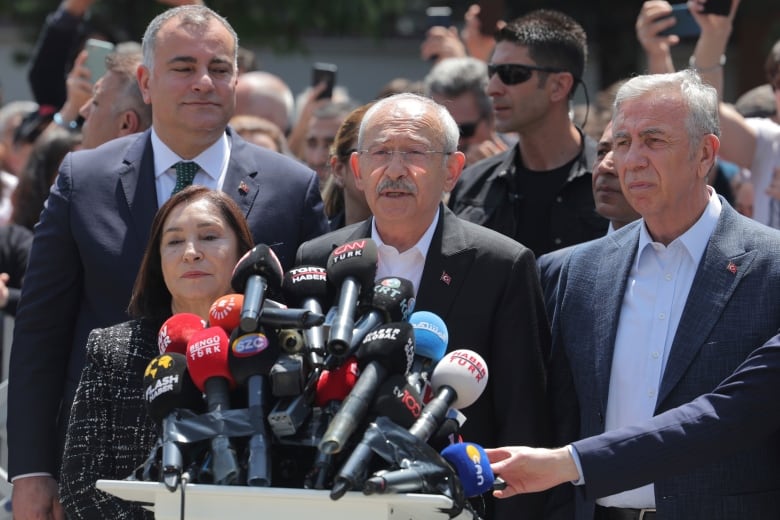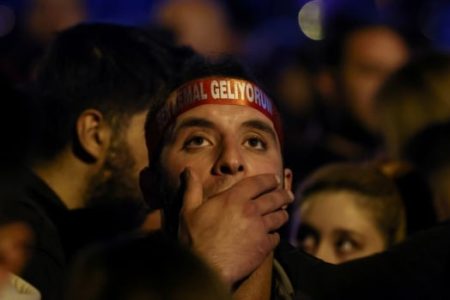A pair of news outlets in Turkey provided different partial results from the country’s presidential election Sunday, with the state-run news agency indicating with three-quarters of ballot boxes counted that President Recep Tayyip Erdogan would squeak out a victory but an opposition-leaning agency saying the contest was headed toward a runoff.
The state-run Anadolu Agency said Erdogan was leading with 51 per cent of the vote, while Kemal Kiliçdaroğlu, his main challenger, had garnered 43 per cent after 75 per cent of ballot boxes were tallied. The ANKA news agency said that with ballots from 76 per cent of boxes counted, Erdogan had won 48 per cent compared to Kiliçdaroğlu’s 46 per cent.
If no candidate secures more than 50 per cent of the vote, the top two vote-getters will face a runoff on May 28.
Further complicating the picture, the opposition accused Anadolu of manipulating results, insisting that Kiliçdaroğlu was narrowly leading with 47.42 per cent over 46.80 per cent for Erdogan.
Istanbul Mayor Ekrem Imamoglu, who campaigned on behalf of Kiliçdaroğlu, alleged that ruling party monitors were “regularly objecting” to results from ballot boxes that placed Kiliçdaroğlu ahead.
Erdogan has governed Turkey as either prime minister or president for two decades. In the run-up to the election, opinion surveys had indicated the increasingly authoritarian leader narrowly trailed his challenger.
The race, which largely centred on domestic issues such as the economy, civil rights and a February earthquake that killed more than 50,000 people, had appeared to be shaping up as the toughest re-election bid of the Turkish leader’s 20-year rule.
With the partial results showing otherwise, members of Kiliçdaroğlu’s centre-left, pro-secular Republican People’s Party, or CHP, disputed Anadolu’s numbers, contending the state-run agency was biased in Erodgan’s favour.
“We are ahead,” tweeted Kiliçdaroğlu, 74, who ran as the candidate of a six-party opposition alliance.
The election could grant Erdogan, 69, another five-year term or see him unseated by Kiliçdaroğlu, who campaigned on a promise to return Turkey to a more democratic path and to repair an economy battered by high inflation and currency devaluation.
Inflation, earthquake, war in Ukraine figure into the election
Voters also elected lawmakers to fill Turkey’s 600-seat parliament, which lost much of its legislative power under Erdogan’s executive presidency. If his political alliance wins, Erdogan could continue governing without much restriction. The opposition has promised to return Turkey’s governance system to a parliamentary democracy if it wins both the presidential and parliamentary ballots.
More than 64 million people, including 3.4 million overseas voters, were eligible to vote. This year marks 100 years since Turkey’s establishment as a republic — a modern, secular state born on the ashes of the Ottoman Empire.
Voter turnout in Turkey is traditionally strong.

Under Erdogan, Turkey has seen the suppression of freedom of expression and assembly. The country is wracked by a cost-of-living crisis that critics blame on the government’s mishandling of the economy. The president contends low interest rates tame inflation, and he pressured the central bank to reflect his view.
The latest official statistics put inflation at about 44 per cent, down from around 86 per cent. The price of vegetables became a campaign issue for the opposition, which used an onion as a symbol.
Turkey is also reeling from the effects of a powerful earthquake that caused devastation in 11 southern provinces in February, killing more than 50,000 people in unsafe buildings. Erdogan’s government has been criticized for its delayed and stunted response to the disaster, as well as a lax implementation of building codes that exacerbated the casualties and misery.
Internationally, the elections were seen as a test of a united opposition’s ability to dislodge a leader who has concentrated nearly all state powers in his hands and who has increasingly enjoyed influence on the world stage.
Erdogan, along with the United Nations, helped mediate a deal that has allowed Ukrainian grain to reach the rest of the world despite Russia’s war in Ukraine. The agreement is set to expire in days, and Turkey hosted talks last week to keep it alive.
The war in Ukraine inspired Finland and Sweden to seek NATO membership as protection against potential Russian aggression. But Erdogan has held up Sweden’s accession to the alliance and demanded concessions, contending that nation was too lenient on pro-Kurdish groups and followers of a U.S.-based cleric who Turkey considers national security threats.

